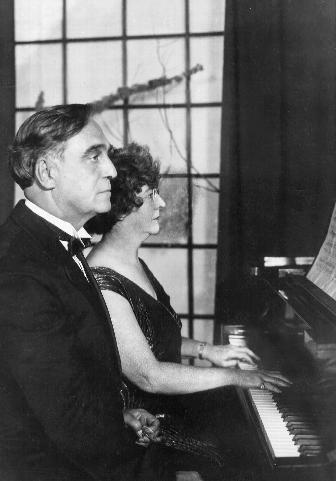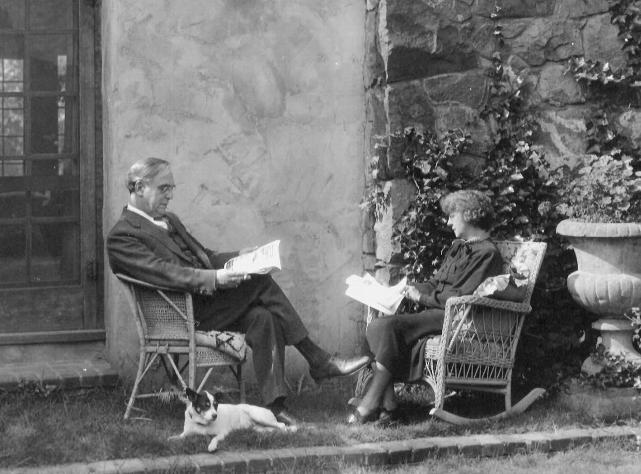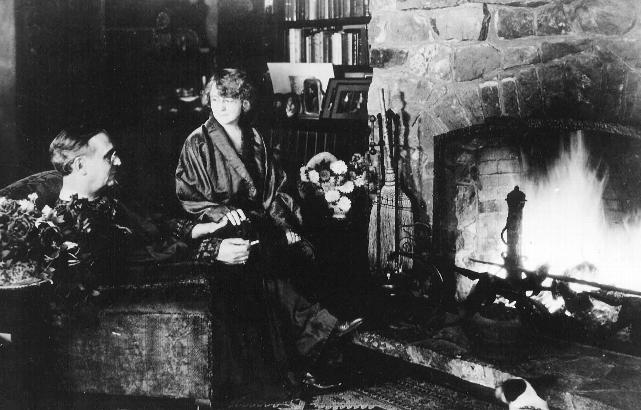
Paul Petri was born in Newark, New Jersey, April 22, 1877. His musical career began in the church choir as a teenager. Paul was a tenor who studied voice in New York City and then traveled to Europe to continue his musical training under eminent teachers in London and Berlin. While he was abroad, Paul met Lillian Jeffreys, a fine pianist. Lillian Petri was born in Brooklyn, New York, on August 2, 1877. She was an accomplished pianist who studied and taught piano in New York, Berlin, and London. For seven years, Europe was the Petri’s home, and Paul sang in both concert and opera there. He had principal operatic roles at the Saxon Royal Opera at Dresden, the Ducal Opera at Attenburg, and the Municipal Opera at Chemnitz, singing more than forty different parts. In Dresden he sang the principal role in “II Trovatore” when he was sponsored by the great conductor, Arthur Nikisch of Leipzig. Just as he was about to start his contract with the Hamburg Municipal Opera, World War I began, and he returned to the U.S.
During the next four years, Paul sang and taught voice in Newark and New York. Lillian often accompanied him on the piano and gave private lessons. In 1918 the Petris moved to Portland where Paul became the head of the Department of Voice at the Ellison-White Conservatory, and Lillian became assistant teacher of piano.
Paul Petri’s long career at Oregon Agricultural College began in 1924 as director of the School of Music. His arrival ushered in a new era in music at the college. Working closely with Lillian, Paul gave the Glee Club for men and the Madrigal Club for women new verve and desire for excellence. Music classes had met in Benton Hall since 1908. In the Petris’ time, music took over the whole top floor, with large classrooms cut up into practice rooms and offices. The former chapel, with its sloping floor and stained glass windows, became the rehearsal room for vocal groups.

The Petris built their charming English-style home at 3650 NW Tyler the year after they came to Corvallis. Their home came to be known as the “Casa Musica”—it was always open to students and friends who enjoyed dropping by and being warmly welcomed. The Petris often entertained visiting musicians and did so in distinctive style. Their home became a performance hall and center of culture in Corvallis. Students gave recitals, dramatic readings, and other performances in the large vaulted living room, which even contained a stage and tiny balcony. In 1927, Ted Roy, a junior from Pilot Rock, brought nationwide attention to the college when he won first place in the state in the national auditions sponsored by Atwater Kent, a manufacturer of radio receiving sets. With Paul Petri as his accompanist, Roy went on to New York City, where he won second place in a contest that was broadcast across the country. In the next two years, other Petri students won in-state Atwater Kent auditions but did not advance beyond San Francisco. In 1928, the Glee and Madrigal clubs went on tour with the operetta, “H.M.S. Pinafore.” The 52-person troupe traveled by rail to give performances in nine eastern Oregon towns. The next year they took “The Chimes of Normandy” on tour. The Petris made many trips around the state to seek out fine music students and offer private scholarships. Many of their students performed over the state-owned radio station, KOAC.
Paul was affiliated with Tau Kappa Epsilon fraternity, American Association of University Professors, Masonic Lodge, Scottish Rite, Shrine, Order of Eastern Star, Corvallis Chamber of Commerce, Corvallis Rotary Club, and Phi Mu Alpha music honor group. Lillian was a member of Delta Zeta sorority, PEO, and Euterpe, campus music honorary. For two years she served as Oregon’s President of the National Federation of Music Clubs.
Professor and Mrs. Petri were beloved teachers, respected by their students and the community. Two generations of students remember Professor Petri as a fixture at the required freshman convocations where, with great gusto, he led the singing. Professor Petri retired in 1947, after twenty-four years of teaching. Lillian continued to give private lessons in Corvallis. Paul was always willing, and often called upon, to provide musical entertainment. A little of their time was given to gardening, playing bridge, or occasional salmon fishing, but music was life’s work and love for the Petris. Lillian Petri died July 26, 1955, at the age of 78; Paul died September 20, 1958, at the age of eighty-one.

The musical influence of Paul and Lillian Petri continues today. Although the Petris had no children, they were very interested in young people, and they bequeathed their entire estate to BCF to help young musicians. Almost without exception, all of the Petri award winners have gone on to distinguished careers. The Lillian & Paul Petri Music Study Fund grants one of the most generous music scholarships offered in the United States. Since the Petri Award was first given in 1962, grants have gone to thirty-two top Oregon musicians. The first scholarship award made from the Lillian & Paul Petri Music Study Fund in 1962 to Miss Edith Kilbuck, a pianist and instructor of music at Lewis and Clark College and the University of Portland. She traveled to Vienna, Austria, to study under Professor Seidlhofer. When Miss Kilbuck was asked once what this award meant to her, she conveyed her “strong sense of gratitude” in the following statement:
The Petri Award provided an opportunity for both focus and diversification in my education and professional career. After having practiced my profession several years as teacher, performer, and coach/accompanist, I recognized those areas in which I wanted to concentrate my efforts. To be free to do this additional work without the necessity of earning a living at the same time was a real privilege. Living in Vienna and traveling elsewhere in Europe provided such an immediate and first-hand experience of so much of our cultural heritage — general history, music history, German language and literature, painting, sculpture, architecture, etc. I feel I took a ‘giant step’ toward becoming truly educated during that year as recipient of the Petri Award.
As expressed in his letter to the board written before his death, Dr. Petri’s vision was to provide scholarships to enable young Oregon musicians study music for a year in a foreign country. However, recognizing that circumstances change over the years, Dr. Petri gave BCF’s Board of Directors wide discretion in meeting his vision. Considering the increased cost of foreign travel since the fund was first establish, and in light of the many good music schools which have prospered in the United States since the mid-20th century, the Board has determined that the scholarship may be used for study domestically as well as oversees.
The determination of whom shall be granted a scholarship from the Lillian & Paul Petri Music Study Fund is made on the basis of a musical performance competition judged by notable professionals in the field. BCF currently partners with Oregon Music Teachers Association (OMTA) to plan and facilitate the competition. Please contact Dr. Julia Hwakyu Lee with questions concerning the competition.
